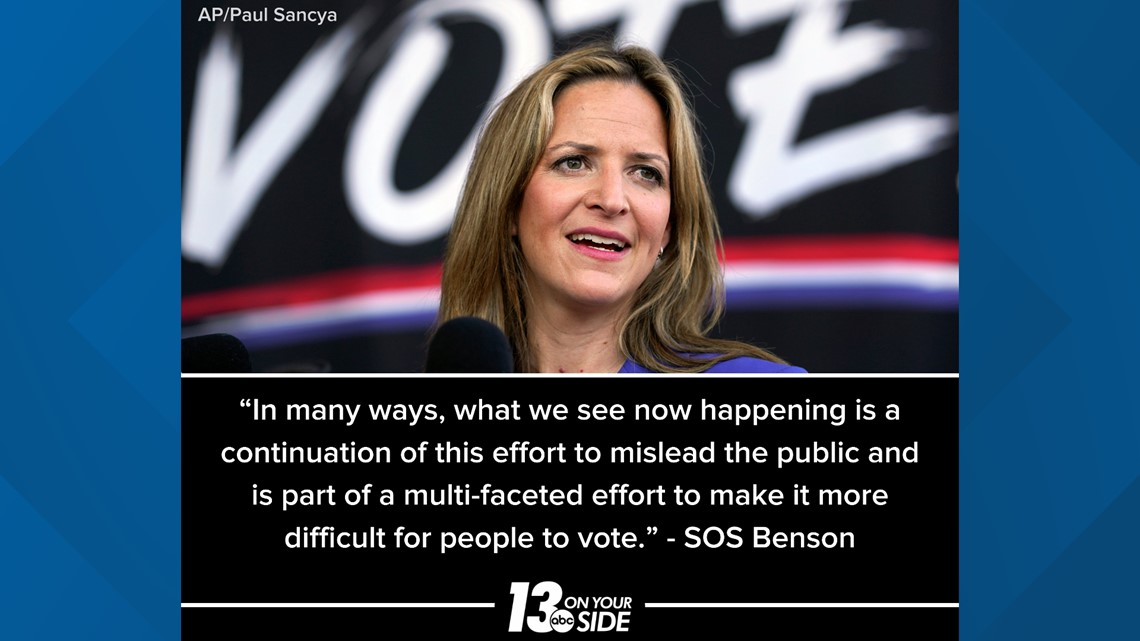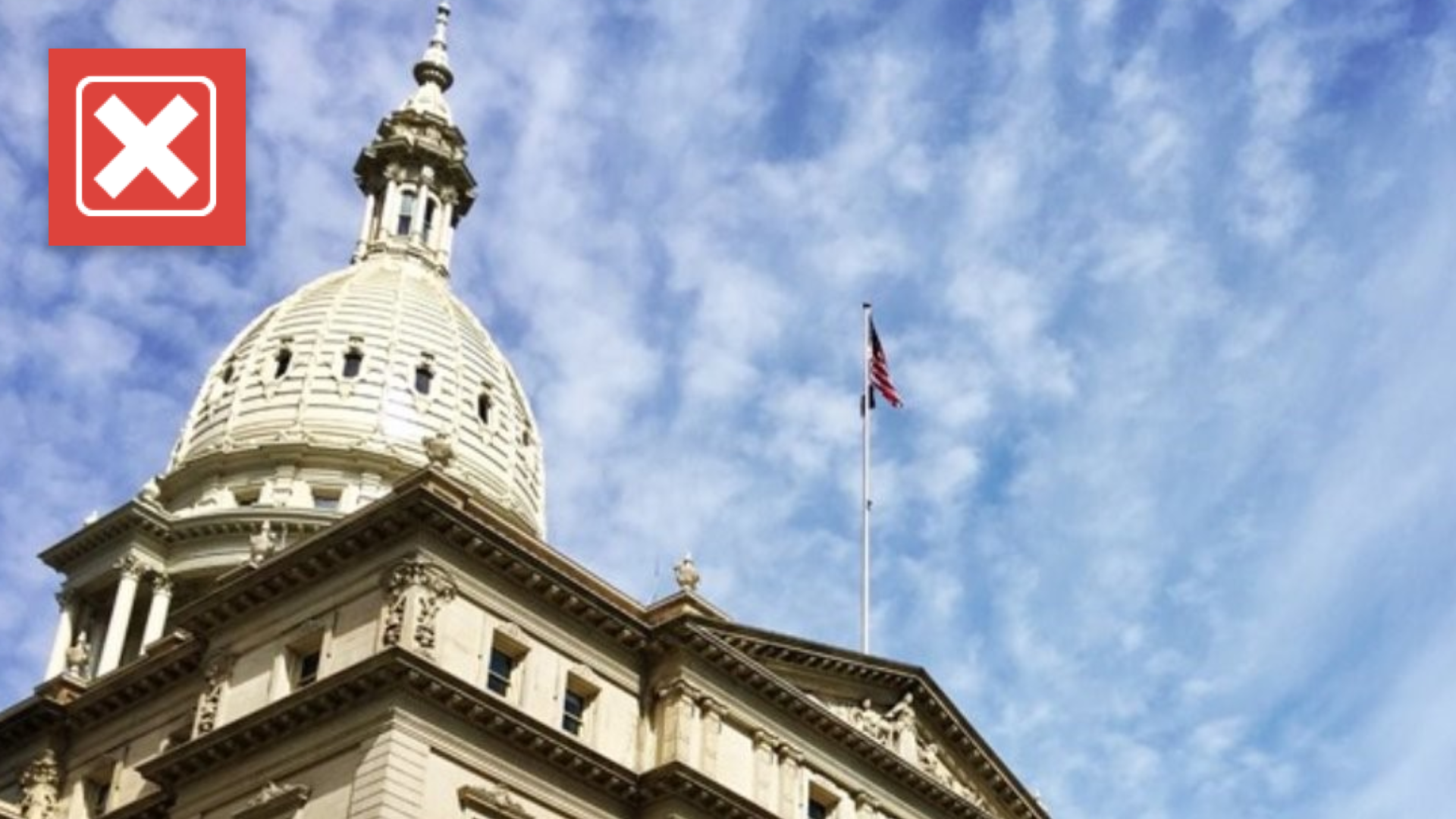LANSING, Mich. — The November election is just a few weeks away. It will be business as usual at the polls, but there is an effort by Republican state legislators to change voting laws for future elections.
Some GOP lawmakers are now citing a poll that came out last May. They say proves Michiganders support their efforts. Democrats say that's not true. The Dems say the proposed changes will make it more difficult to vote and the Republicans are being dishonest about the poll's findings.
The Michigan Senate GOP account tweeted, "Republicans, Democrats and Independents overwhelmingly support the simple act of showing ID when voting."
"We shouldn't cheapen our debate on this floor by calling people terrorists because we have a policy disagreement with them on the simple expectation that they show their photo ID card to vote, something that is supported by about 80% of voters in Michigan," Republican Senator Tom Barrett said. "Something that is supported by Republicans, Independents, and yes, even Democrats in virtually every public poll that has been conducted. In fact, if you look at the cross tabs on these polls, the only demographic of people who do not support showing your photo ID as a requirement to obtain your ballot are Democrat elected legislators in Michigan."
Sen. Tom Barrett, (R) Potterville, was responding to Democrat members referring to the Senate Bill 303 as "legislative terrorism."
THE QUESTION
Do nearly 80% of Michigan voters support GOP-led voting bills.
THE SOURCES
- Michigan Legislature
- Sandy Baruah, President and CEO of the Detroit Chamber of Commerce
- Jocelyn Benson, Secretary of State for the State of Michigan
THE ANSWER
No, the statistic is being used in a misleading way and requires context. Yes, nearly 80% of Michigan voters are in support of having some kind of identification, but we can verify that the way that the statistic is being used by the GOP, in support of bill 303, is not accurate.
WHAT WE FOUND
He is using this statistic in defense of Senate Bill 303, a new proposed voting law that critics say would make it much harder to vote.
"Our polls didn't use language from proposed legislation and asked the question, 'do you support this particular ballot initiative or this legislative language or not," Baruah said. "Our poll took the general themes of what is being proposed, at least as of August of 2021, and we took those general themes. But I want to be very careful and clear that we did not pull on specific legislative language."
Before addressing the answer, we must address the laws.
Currently, Michigan requires an ID to vote. People can vote in person without photo ID if they sign an affidavit, or a form, saying they do not have one with them at the polls. This applies to people who forget their driver's license, as well
SB 303, would no longer allow this. If passed, the only way for people who don't have an ID to vote is to cast a provision vote. To make those provisional ballots count, the voter would have to appear at their clerk's office within six days of the election and present photo ID, and it still may not be counted.
That is not the only roadblock to SB 303. The bill adds a signature matching provision for in-person voting. Untrained poll workers would have to compare signatures and the Bill gives them the ability to reject anyone for "not matching the digital signature with the paper one." Critics say this will cause longer wait times.
All of these aspects are just for in-person voting. Absentee voting would be drastically changed as well. Now, onto the poll.
The Glengariff Group poll, commissioned by Baruah and the Chamber was completed in May of 2021, and answered by 600 Michiganders in a live phone call.
Baruah confirmed the question was asked exactly how it was written: Do you support or are you opposed to "require that every voter coming to the polls present a government-issued identification to cast their ballot."
"Obviously we didn't poll on specific legislation," he added.
In fact, the poll, just under that, is another question relating to tightening voter restrictions: "Have you seen or heard anything about these efforts in Michigan?"
More than 70% had not heard anything regarding the proposed voting laws. Meaning, there is no way for 80% of Michigan voters to support SB 303 when according to the second poll question, a vast majority aren't aware of the proposed voting laws, much less SB 303.
"What we see now happening is a continuation of this effort to mislead the public and is part of a multi-faceted effort to make it more difficult for people to vote," Sec. Benson said in an exclusive interview with 13 ON YOUR SIDE. "It's a deeper, in some ways more pernicious effort to dismantle democracy from within, using this misinformation, and throwing around words like 'voter security' and 'election fraud' and 'voter ID' because it polls well.


"But [its] not being truthful with voters about what the laws that are actually being furthered or discussed or enacted, would actually do to every citizen in our state. It's essentially a lot of additional hurdles that someone needs to jump through in order to simply cast their vote."
Only about 11,000 voters in Michigan don't have a traditional ID, Benson said. That is about .2%. Election officials are able to verify the voters' residency another way, like by phone bill. She said the voters who would be most impacted by these bills are Black, elderly, rural, Democrat, disabled, young or non-native English speakers.
"If you pass Senate Bill 303, without doing the work ahead of time to get everyone IDs and actually do that research to make sure those 11,000 citizens, that all new voters have ID, then you're essentially disenfranchising those citizens — limiting their options to vote or creating complete barriers to them voting," she added.
FURTHER INTERVIEW WITH SECRETARY OF STATE JOCELYN BENSON TO AIR ON WZZM 13 ON YOUR SIDE ON SUNDAY, OCT. 17.
So far, Governor Whitmer has vetoed similar voting law legislation four times in the past few weeks. She said not only will disenfranchise voters, but they will also falsely confirm beliefs that voter fraud happened in the 2020 election.
Michigan has conducted more than 250 audits and found no fraud. Across the country, members of both parties have said claims of widespread voter fraud are baseless.
"It's just like a lot of issues these days," Baruah said. "People like to cherry-pick their facts to suit their situation."
►Make it easy to keep up to date with more stories like this. Download the 13 ON YOUR SIDE app now.
Have a news tip? Email news@13onyourside.com, visit our Facebook page or Twitter. Subscribe to our YouTube channel.

